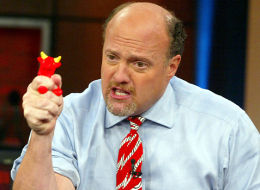 By now the entire Internets have witnessed the extraordinary performance on Jon Stewart yesterday, in which Jim Cramer, the bug-eyed host of CNBC’s Mad Money show, took withering, and deserved, shots about his, and his network’s, participation in the market’s recent massive failure. (TPM has the whole thing up here if you want to watch it again.)
By now the entire Internets have witnessed the extraordinary performance on Jon Stewart yesterday, in which Jim Cramer, the bug-eyed host of CNBC’s Mad Money show, took withering, and deserved, shots about his, and his network’s, participation in the market’s recent massive failure. (TPM has the whole thing up here if you want to watch it again.)
For me the high point came towards the end, with Stewart calling Cramer on the investing hucksterism that has been standard fare on CNBC for so long:
I understand you want to make finance entertaining, but it’s not a fucking game… Selling this idea that you don’t have to do anything — any time you sell people the idea that, sit back and you’ll get 10 or 20 percent on your money, don’t you always know that that’s gonna be a lie? When are we gonna realize in this country that our wealth is work, that we’re workers, and by selling this idea of, hey man, I’ll teach you to be rich, how is that different from an infomercial?
Cramer spends most of the lengthy interview admitting failure and hanging his head. I give him credit for showing up — something that ludicrous grandstander Rick Santelli couldn’t bring himself to do — even though I found his rationalizations mostly unconvincing.
Watching Cramer’s show, which I have only rarely done, has always been a bizarrely alienating experience for me. I got to know the host three decades ago when we both worked at the American Lawyer magazine, Steve Brill’s feisty startup. (I recently wrote a bit about that experience.) I was a callow summer intern, Cramer was a hard-working reporter, and he was extraordinarily generous and helpful to me. I learned a lot from him about how the work of investigative reporting is done. He was clearly an intense and driven guy who seemed to require very little sleep. But, with me at least, he was also for real.
On TV these days, of course, he is anything but. He presents a strange caricature of the addled, hyper-reactive Wall Street lunatic. Since I knew Cramer under other circumstances, I have always assumed that this was a persona, a dramatic construct, a Brechtian parody of the personality of capitalism — and a daily illustration of the “greater fool” theory.
Maybe that’s giving Cramer the benefit of too much doubt; but it does seem hard to miss that the show is intended as comedy. Do people actually make investment decisions by listening to a man who (as Stewart puts it) “throws plastic cows through his legs shouting ‘Sell, sell, sell!’ “? And if they do, should Cramer at least share with them the blame for losses resulting from such gullibility?
I don’t know. But I do know that if you play a role long enough, you become the part. (As I recall, Vonnegut’s Mother Night has something to say about this. Also, in a different vein, Kurosawa’s Kagemusha.) In his Jon Stewart appearance, I thought I saw glints of the real Cramer poking through the madman act. But at this stage of the show, they’re pretty faint.
Post Revisions:
- March 13, 2009 @ 12:03:46 [Current Revision] by Scott Rosenberg
- March 13, 2009 @ 11:59:46 by Scott Rosenberg
